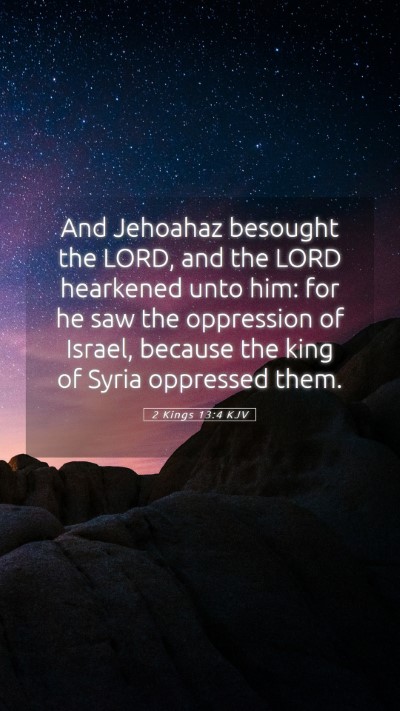Bible Verse Meaning: 2 Kings 13:4
Verse: "And Jehoahaz besought the LORD, and the LORD hearkened unto him: for he saw the oppression of Israel, because the king of Syria oppressed them."
This passage from 2 Kings 13:4 holds significant value in understanding the nature of God's mercy and the dynamics of Israel's relationship with its enemies. Below, we present a combined interpretation of this verse based on respected public domain commentaries, including insights from Matthew Henry, Albert Barnes, and Adam Clarke.
Summary of Insights
This verse illustrates a key moment in Israel's history where Jehoahaz, the king of Israel, turns to God in the face of oppression from the king of Syria. The significance of this verse is profound and encompasses several themes of Bible verse understanding and biblical exegesis:
- Desperation of Jehoahaz: Jehoahaz's plea signifies his recognition of Israel's dire situation. Matthew Henry suggests that his desperation led him back to God, highlighting the importance of turning to the divine in times of crisis.
- God's Response: The verse mentions that God "hearkened unto him," indicating God's readiness to listen to the cries of His people. Albert Barnes points out that this reflects God's continual engagement with Israel despite their disobedience and failures.
- Oppression as a Catalyst for Prayer: The oppression by the Syrian king caused the Israelites to seek God earnestly. Adam Clarke emphasizes this as a common theme whereby suffering leads to seeking the help of the Almighty, showcasing the transformative power of adversity.
- Compassion of God: The passage underscores God's compassion. Despite the previous sins of Jehoahaz, God hears his plea. This aspect of God's character is essential for Bible verse commentary and offers a lens through which we can understand the broader narrative of God's dealings with Israel.
- The Cycle of Repentance and Deliverance: The interplay of sin, oppression, repentance, and deliverance is evident in this verse. It sets a pattern seen throughout the Old Testament—when the people turn back to God, they find mercy and help. This reflects a classic theme for Bible study insights.
Interpreting the Historical Context
To appreciate the full meaning of 2 Kings 13:4, it is important to look at the historical backdrop. Jehoahaz ruled during a tumultuous period when Israel was frequently attacked by the Syrians, leading to significant suffering among the Israelites. Understanding this context allows readers to grasp the urgency behind Jehoahaz's supplication to God and the reason behind God's merciful response.
Cross References
- Psalm 106:43-45 - God's enduring mercy towards Israel in times of trouble
- 2 Chronicles 33:12-13 - King Manasseh's cry for help and God's restoration
- Isaiah 30:19 - The promise of God's compassion for His people in distress
Application in Daily Life
The lessons from 2 Kings 13:4 extend beyond its historical context. For those involved in Bible study groups or online Bible study, this verse offers valuable insights into the necessity of turning to God in our own times of hardship. It encourages individuals to recognize their need for divine intervention and underscores the importance of prayer during challenging times.
Moreover, the repetitive cycle of sin, suffering, repentance, and deliverance serves as a reminder that no matter how far one strays, God's compassion is always within reach for those who seek Him earnestly. This message is especially pertinent for Bible study resources that aim to help individuals understand the healing power of prayer and the importance of repentance.
Conclusion
In summary, 2 Kings 13:4 encapsulates vital themes of desperation, divine compassion, and the cyclical nature of Israel's relationship with God. As we seek to interpret and apply this verse, it reminds us that in our seasons of trial, turning to God in prayer is not just an act of desperation, but also a demonstration of faith in His ability to deliver and restore. Through the combined insights of established commentators, we gain a deeper understanding of this passage and its relevance in our spiritual journey.


